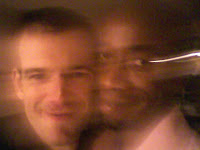here is an essay i'm working on for Logos, the student newsletter of PSR. i'd appreciate comments if anyone has them:
Recently a prospective student asked me about an incident in a class he visited. Introducing himself, he mentioned that he was also looking at Fuller. Someone made a sarcastic comment and the class laughed. The prospective student laughed, too, he said, “but I don’t really know why. I haven’t seen much difference between the schools so far.”
Talking about this later, Joellynn Monahan (my boss, the Admissions Counselor at PSR) told me about a sermon she heard that demonized fundamentalists using the same “fundamental” framework the sermon was supposedly resisting. Afterward, in the community prayer, she prayed, “May we be saved from fundamentalisms in our own progressive theologies and ideologies.” May we be saved, indeed, from our own progressive arrogance. For those of us who are former Christian conservatives, may we remember the possibility of movement, deepening, and expansion of spirituality. For those who are spiritually progressive, may we remember who our God is. The God I used to believe in had limits, exclusion, and a sense of security. My perspective has changed, but I continue to fight that way of relating to God: as if there are limits on who can experience love, grace, and acceptance. In a recent class on post-colonial theory, someone asked, “Can you have an identity without excluding an ‘other’?” My answer (for now) is “No, there are boundaries between what is and what isn’t – but you can have an identity without committing violence against an ‘other’ who is outside your identity.” To me, progressive faiths, in their many manifestations, derive power from our experience of freedom, love, acceptance, and a living, ongoing revelation of spiritual knowledge that isn't confined to a single book, time period, or authoritative interpreter. My hope is that our faiths will not be weakened by hatred or by vilifying those we disagree with.
My mom and I are dealing with her fundamental objection to my gayness, her faith-based inability to accept the legitimacy of my deeply loving and joyful relationship with my partner – and my inability to see how homosexuality is sinful, my insistence that my relationship is acceptable to God and humanity. Our conversations are painful and awkward, but in our own ways of faith, we both believe that God is still speaking to us in this. Despite radically different theologies, we are committed by our faith to respecting each other’s spiritual journey and to a (sometimes desperate) attempt to maintain a loving relationship. There was a time when I condemned gays to hell, and a time when I switched the language and not the theology – condemning anti-gay Christians and conservative fundamentalists to hell. Now, through my ongoing spiritual journey, in conversation with my mom, I am learning to let go of spiritual arrogance, to find room in my faith for spiritual pathways that work for others even if they don’t work for me.
If we want to heal the wounds of violent exclusion in ourselves and in the world, we must allow our own and others’ wounds to speak anger, pain, and justice without eternal condemnation and further destruction—to be healers instead of perpetrators of further violence.
This difficult work requires patience, forgiveness, faith in possibilities, and boundless, irrational hope. To me, that’s part of what Christianity is about.
 Yesterday, we took Mama (my mother-in-law) to the airport, back to Florida after an unsuccessful year of trying to find steady work that pays enough to be able to survive living in the Bay Area. It was sad to say goodbye to someone that I've grown close to, someone who has become a member of my family (or, actually, to whom I've become a member of her family). And today after a church service that emphasized how much abundance and blessing we receive as human beings, we had a fantastic brunch with my friends Emily & James. Then I started reflecting on a few difficult conversations I've had lately, with and about relatives and ancestors, the complications of family relationships. Some days are just a little deeper than others. I came home and listened to "Home to Me" by Josh Kelley (and a version from Noah's Arc, by Patrik-Ian).
Yesterday, we took Mama (my mother-in-law) to the airport, back to Florida after an unsuccessful year of trying to find steady work that pays enough to be able to survive living in the Bay Area. It was sad to say goodbye to someone that I've grown close to, someone who has become a member of my family (or, actually, to whom I've become a member of her family). And today after a church service that emphasized how much abundance and blessing we receive as human beings, we had a fantastic brunch with my friends Emily & James. Then I started reflecting on a few difficult conversations I've had lately, with and about relatives and ancestors, the complications of family relationships. Some days are just a little deeper than others. I came home and listened to "Home to Me" by Josh Kelley (and a version from Noah's Arc, by Patrik-Ian).
